Table of Contents
The best Python books for beginners can be tricky to find, especially if you have no programming experience.
And with Python being used in diverse fields like web development, data science and machine learning, it’s a programming language you don’t want to miss out on.
In this post you’ll discover the best Python book for beginners.
We’ll also show you their features, main topics, layout & structure, and more.
This post contains affiliate links. I may receive compensation if you buy something. Read my disclosure for more details.
TLDR: Best Python Books for Beginners
Our picks for absolute best Python books for beginners include:
🔥 Best Overall 🔥
Python Crash Course
💥 Best for Newbies 💥
Head First Python: A Brain-Friendly Guide
💸 Best Value 💸
Python Programming: A Beginner’s Guide to Learn Python in 7 Days
Best Python Books for Beginners
1. Intro to Python for Computer Science and Data Science
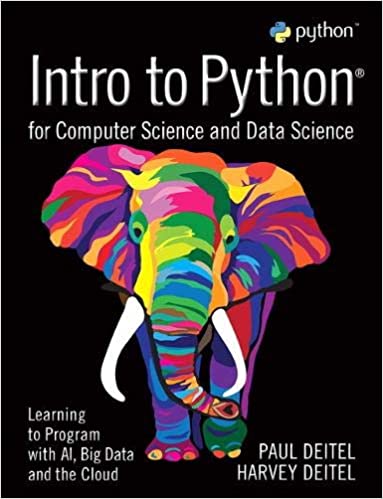
Don’t let the elephant cover fool you: this book is all about the Python.
And as the name of this book suggests, you’ll learn Python in relation to both computer science and data science.
Intro to Python for Computer Science and Data Science is one of the best Python books for beginners specifically interested in data science.
So, if you are following a path towards data science, we highly recommend Intro to Python. It’s packed with real-world datasets and artificial intelligence technologies.
Even better? There are hundreds of robust examples.
In addition, you’ll work on challenging exercises and projects throughout the book. So there’s no sitting back and relaxing here.
Rather, you’ll frequently work on interactive, engaging content.
Again, Intro to Python is a stellar book to learn Python. But it will also delve into the fundamentals of data science.
💡Want to learn more about Python as it relates to data science? Check out the course Introduction to Data Science in Python by DataCamp.
2. Learning Python
This 5th Edition of Learning Python by Mark Lutz includes Python versions 2 and 3.
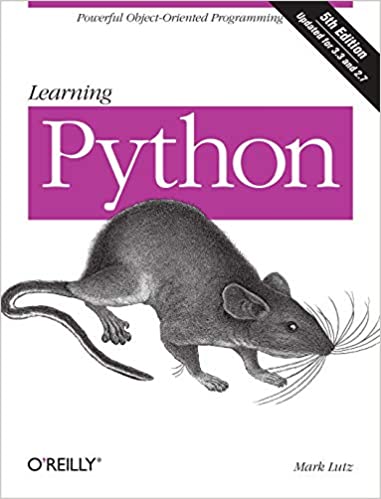
It’s broken down into 9 comprehensive parts covering:
- types and operations
- statements and syntax
- functions and generators
- modules and packages
- exceptions and tools
And beyond.
First you’ll learn about some of Python’s built-in types such as lists and dictionaries.
You’ll also:
- learn about Python’s syntax model
- create objects
- avoid code redundancy by using functions
- write larger programs using exception handling
- discover Python decorators, metaclasses and descriptors
And more.
Learning Python makes our list of best Python books for beginners since it’s well written and filled to the brim with illustrations, hands-on exercises and quizzes.

… If you really want to know everything about Python, this book is for you.
– Daniel slonov, Customer
3. Head First Python: A Brain-Friendly Guide
Another banger of a book published by Head First!
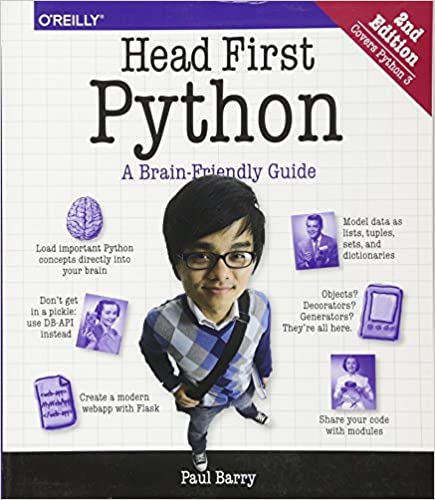
In Head First Python, instead of walls of text, it uses tons of illustrations and examples to make the material more relatable.
In this 2nd edition covering Python 3, there are plenty of notes throughout the book to explain more difficult parts of concepts.
Head First Python by Paul Barry is arguably one of the best Python books for beginners.
You’ll learn about:
- list data
- structured data
- code reuse
- storing and manipulating data
- advanced iteration
And much more.
You’ll also discover:
- how to build your own Python web app
- database management
- exception handling
- data wrangling
And more.
If you’re looking for a book to make the Python language stick, we think Head First Python is the way to go.
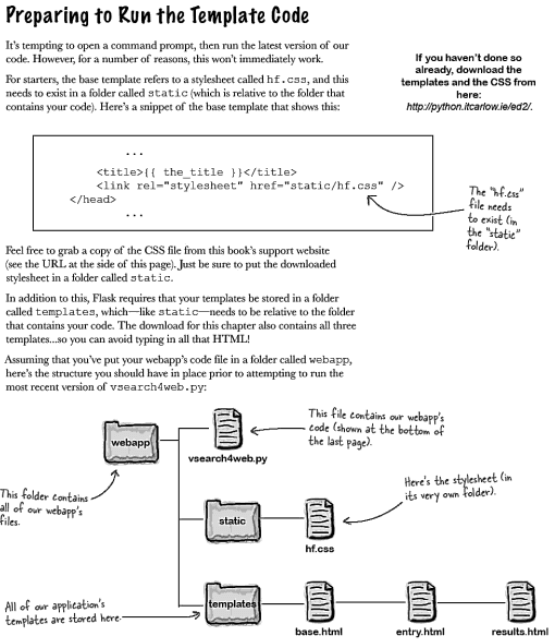
🧠 Thoughts on Head First
Whenever you’re learning a programming language and there’s a Head First book about it, GRAB IT.
The way Head First Python teaches concepts really just sticks to your brain like hot sauce to wings.
It’s an excellent investment either as your primary learning source or as a companion to our other best Python books for beginners.
4. The Quick Python Book
The Quick Python Book is written for Python beginners with some other previous programming experience.
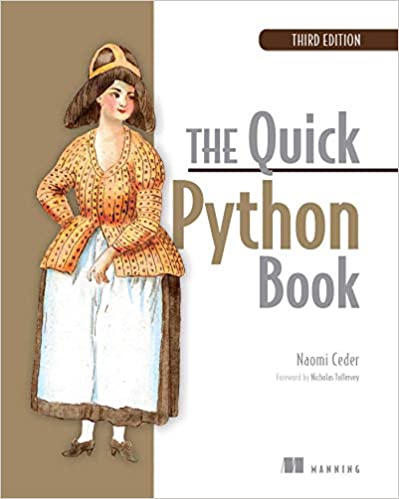
While it does cover programming features that expand beyond Python, The Quick Python Book by Naomi Ceder exerts most of its energy teaching Python 3.
So aside from basic syntax, you’ll also learn about Python libraries, packages and tools.
In addition, there are 5 chapters on Python as it’s applied to data science.
💡Looking for a course to take you from Python beginner to experienced developer? Sign up for Complete Python Developer on Zero to Mastery.
Throughout the book, you’ll work on exercises to reinforce concepts. Also, there are plenty of examples to clarify any questions you may have.
5. Python: -The Bible-
Praise Python! Python: -The Bible- by Maurice Thompson is a compilation of three manuscripts which contains Python programming for beginner, intermediate and advanced learners.
But today we’re just focusing on the beginner-level portion.
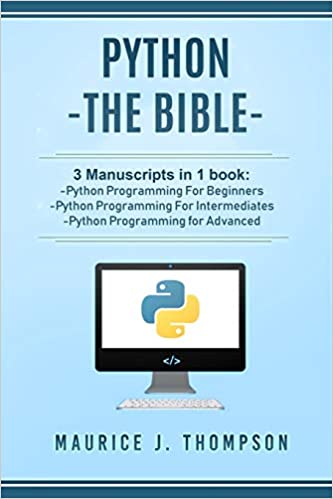
The intention is that you can learn the basics of Python in 7 days. It’s broken down into easily digestible parts.
Python: -The Bible- is one of the best Python books for beginners who are interested in taking their skills to the next level.
First you’ll learn about Python and its history. Then you’ll learn how Python works. After that, you’ll get into the meat of the book:
- installing Python
- writing your first Python program
- variables, strings, lists, tuples
- user-defined functions in Python
And much more.
Finally, you’ll work on a series of practice projects.
6. Learn Python 3 the Hard Way
Author Zed Shaw refers to Learn Python 3 the Hard Way as a course, not a book.
That’s because in addition to the book, Zed includes over 5 hours of video to accompany your learning.
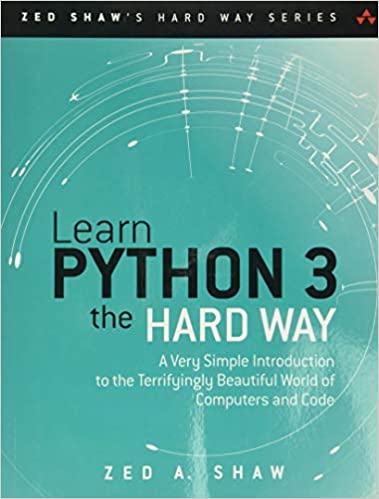
With 52 exercises, you’ll work through the problems step-by-step from the very first lines of code.
By watching the programs run, you’ll come to understand how computers work.
Then you’ll learn how to:
- break
- fix
- and debug your code
All this is done while following alongside the video portions of the course.
Because of the course-like structure, we think Learn Python 3 is a must-have for students who thrive in a more academic setting.
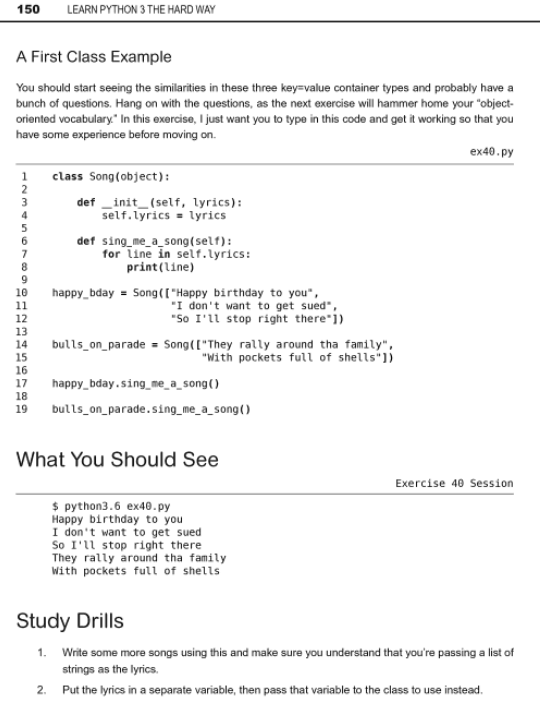
7. Automate the Boring Stuff with Python
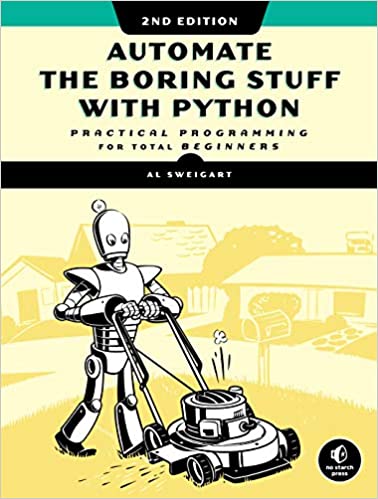
Automate the Boring Stuff with Python by Al Sweigart is geared towards those with no prior programming experience.
You’ll learn how to use Python to automate things that would otherwise be done by hand. And therefore, take hours to complete:
- renaming files
- updating spreadsheet cells
- scraping data from websites
- automating Google Sheets
- updating CSV files
And beyond.
With step-by-step instructions, you’ll get complete walkthroughs for different programs. Then you’ll work on practice projects at the end of each chapter.
💡Looking for a beginner course on Python 3? Check out Learn Python 3 on Codecademy Pro.
And with your newly-minted Python skills, you’ll be able to automate similar tasks.
8. The Python Workshop
The Python Workshop by Andrew Bird, et al. is intended for teaching Python to absolute beginners interested either in computer science or data science.
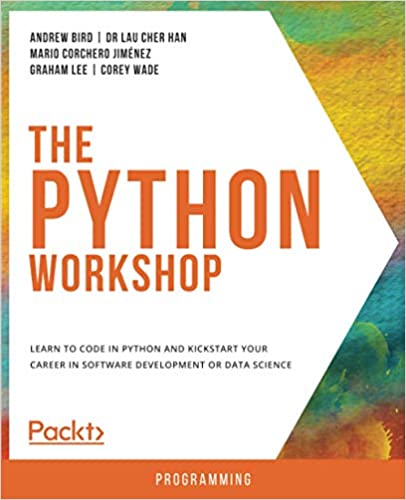
You’ll start by learning how to write simple programs with Python syntax.
Then you’ll learn how to:
- store and retrieve data
- handle files
- write reusable, efficient code
- and more.
As you progress, you’ll learn how to use the Python standard library and write unit tests. Then you’ll learn about other Python libraries like pandas and NumPy.
After that, you’ll learn how to tackle machine learning algorithms, leaving you ready to write your own programs with Python.
The Python Workshop will also show you how to use Python scripts to automate day-to-day tasks.

Great book, very detailed exercises, and all around really useful. Highly recommended if you are thinking of dipping your toes into Python!
– The Bruces, Customer
9. Introducing Python: Modern Computing in Simple Packages
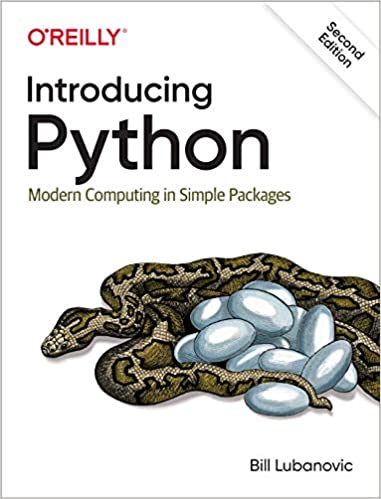
OK, so we think the cover is a little nasty on this one… But we’ll give it a pass since it’s a Python. We’re presuming all those eggs represent the oodles of Python knowledge you’ll gain from this book. 🐍
Introducing Python: Modern Computing in Simple Packages by Bill Lubanovic is geared towards people with absolutely no programming experience.
You’ll learn about Python fundamentals like:
- data types and variables
- dictionaries and sets
- functions
- objects and classes
- modules and packages
And beyond.
Then you’ll move onto more complex concepts such as wrangling data and persistent storage.
You’ll also learn best practices for debugging, testing, and reusing code.
There are exercises at the end of each chapter so you can put to practice what you’ve learned.
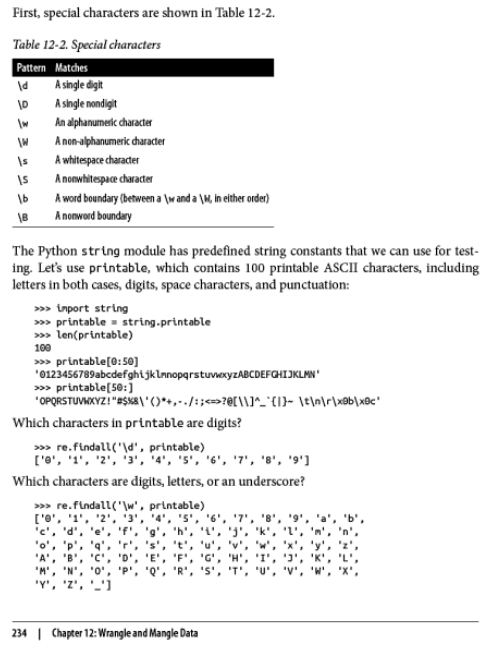
10. Python for Beginners
Coming in at number 10 on our best Python books for beginners is…wait for it… Python for Beginners.
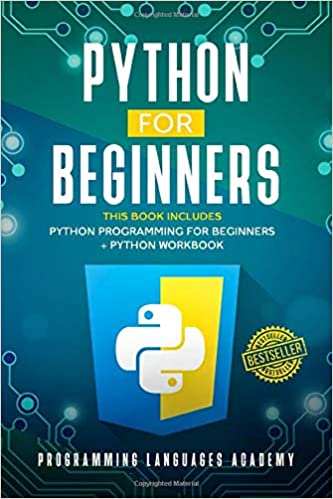
Developed by Programming Languages Academy, this is a two-part book.
The first part teaches Python programming to beginners. Then the second part is a Python workbook.
It’s geared towards readers with no prior programming experience.
Also, like some the other best Python books for beginners on our list, you’ll learn about a few data science fundamentals.
This guide starts with a crash course in setting up Python. You’ll also:
- learn about Python tools and libraries.
- streamline your Python code
- work on exercises & Projects
- practice debugging
And much more.
11. Python Crash Course
💥 Fun fact: Python Crash Course by Eric Matthes is the biggest selling Python book in the world.
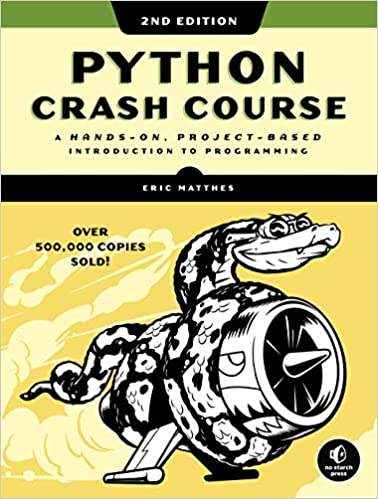
With over a half-million copies sold, one could argue that this is one of the best Python books for beginners.
Honestly? We love No Starch Press. Are they even capable of publishing a bad book?
But back to Python Crash Course. This project-based introduction to programming is ideal for readers with zero programming experience.
However, keep in mind that this is a fast-paced book!
It’s separated into two parts.
In the first half of the book, you’ll work on programming concepts like:
- variables
- lists
- classes
- loops
And beyond.
Then you’ll work on a series of exercises to help you practice writing clean code. In addition, you’ll learn how to make your programs interactive.
After that, you’ll move onto the second half of the book. Here is where you’ll work on three major projects:
- Space Invaders-style arcade game
- data visualizations with Python libraries
- a web app you’ll deploy online
💡Do you learn best with interactive lessons? Check out the course Learn Python 3 from Scratch on Educative.io.
If you want to learn how to write Python programs quickly, we think Python Crash Course is the way to go.
12. Learn Python Quickly
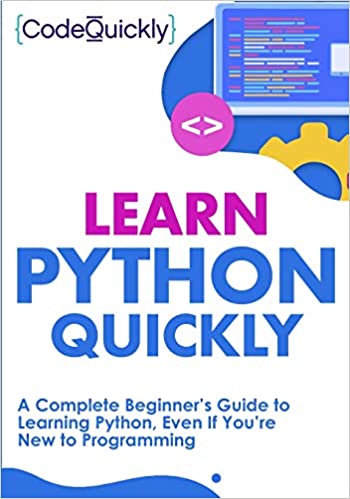
Learn Python Quickly by CodeQuickly is another accelerated Python book for beginners with no prior programming experience.
Whereas you’ll mostly learn about Python fundamentals, you’ll also learn about some more advanced concepts.
So by the end of this book, you’ll have an intermediate understanding of Python programming.
With simple code explanations, you’ll work step-by-step on exercises that contain detailed solutions.
Some topics covered include:
- using Python in the command line and in an Integrated Development Environment (IDE)
- handling inputs and outputs
- error handling
- Python data structures
- object-oriented programming
- recursion
And much more.
Then you’ll work on 2 major projects to combine all the concepts you’ve learned throughout the book.
You’ll also get some source code files that you can run on your computer and use as a reference.
13. Python Pocket Reference
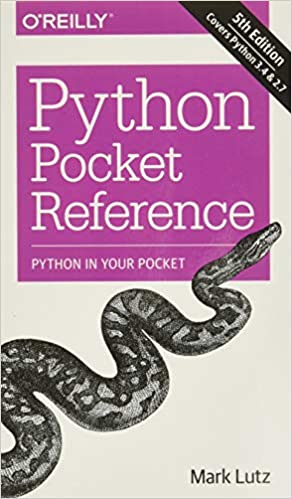
Python Pocket Reference by Mark Lutz is one of the best Python books for beginners who are on the go… But who need that quick reference guide when on the job or just building your skills.
Some of what’s included are:
- types and statements
- special method names
- built-in functions
- standard library modules
And more.
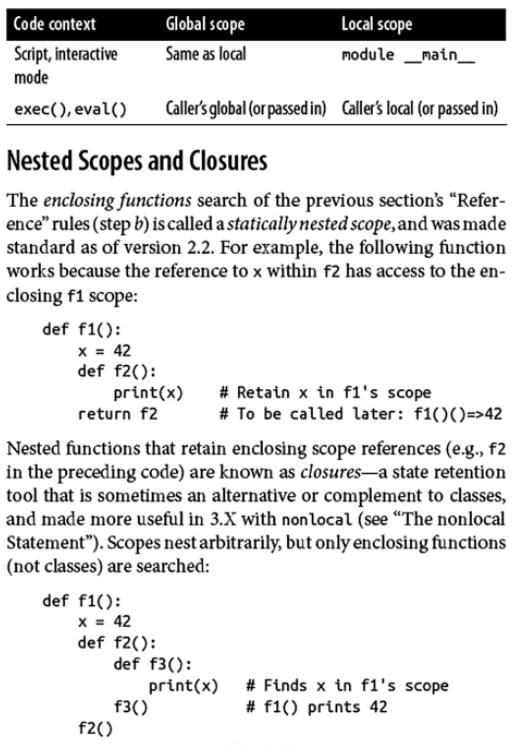
You’ll also discover the Python Database API.
This fifth edition covers both Python 3 and 2.
That said, Python Pocket Reference isn’t written for absolute code newbies. Rather, it’s a good reference for accenting other best Python books for beginners.
14. Python Programming: A Beginner’s Guide to Learn Python in 7 Days

Python Programming by Ramsey Hamilton claims it’ll teach you Python in 7 days. Nice!
This one makes our list of best Python books for beginners since it’s to-the-point while assuming no prior coding experience.
First you’ll learn how to set up your dev environment.
Then you’ll learn about Python fundamentals like:
- variables
- loops
- functions
- tuples
- classes
- modules
- error handling
And much more.
With Python Programming, you’ll learn beginner Python concepts so you can comfortably advance to the next level.

Kudos to the author for offering clear, concise and practical code snippets to illustrate both syntax and logic of the Python programming language.
– Wyatt Earp, Customer
Best Python Books for Beginners Recap
Today we looked at some of the best Python books for beginners. And we came up with 3 that we think are a cut above the rest:
Best Overall
Python Crash Course
Best for Newbies
Head First Python: A Brain-Friendly Guide
Best Value
Python Programming: A Beginner’s Guide to Learn Python in 7 Days
So no matter what you’re looking for, these best Python books for beginners can benefit just about every new Python developer.
Developers searching for the best Python books for beginners are also reading:
- 18 Best Python Courses for Beginners
- 30 Best Python Resources for Beginners
- 12 Best Python Testing Books [Learn Python Testing ASAP]
- 11 Best Python Machine Learning Books[Learn Machine Learning ASAP]
- Codecademy Python Review [Roadmap to Learn Python]
- Python for Programmers Course: Educative.io Review
Is the Python Crash Course book worth it?
We think Python Crash Course is worth it. This project-based introduction to programming is ideal for readers with zero programming experience. However, keep in mind that this is a fast-paced book. The book is separated into two parts. In the first half of the book, you’ll work on programming concepts like variables, lists, classes, loops, and beyond. Then you’ll work on a series of exercises to help you practice writing clean code. In addition, you’ll learn how to make your programs interactive. After that, you’ll move onto the second half of the book. Here is where you’ll work on three major projects. If you want to learn how to write Python programs quickly, we think Python Crash Course is the way to go. Read today’s post for more info.
What are the best Python books for beginners?
We picked the best Python books for beginners based on three criteria. For best overall, we think Python Crash Course takes the win. For absolute beginners, we think Head First Python: A Brain-Friendly Guide is the way to go. And with think Python Programming: A Beginner’s Guide to Learn Python in 7 Days has the best value. Check out today’s post for more information.
Is the Python Pocket Reference book worth it?
We think Python Pocket Reference is one of the best Python books for beginners who are on the go… But who need that quick reference guide when programming in Python on the job or while building your skills. Some of what’s included are types and statements, special method names, built-in functions, standard library modules, and more. Also, you’ll find the Python SQL Database API. This fifth edition covers Python 3.4 and Python 2.7. Python Pocket Reference is not for first-time Python programmers. Rather, it’s an additional reference once you’ve read some other beginner Python books. Read our full review in today’s post.
![14 best python books for beginners [learn python programming] with faded black background](https://realtoughcandy.com/wp-content/uploads/2021/02/best-python-books-for-beginners-cover-1024x576.jpg)